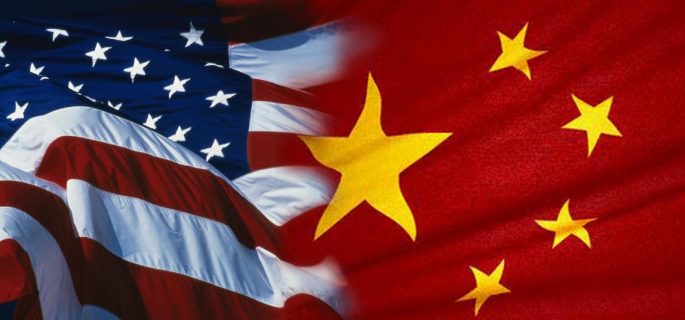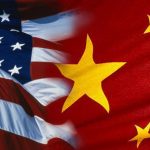Trade fears spur global risk-off moves from Sydney to Shanghai

Asian stocks followed their U.S. counterparts lower after President Donald Trump’s decision to slap tariffs on China heightened concern a trade war could hurt global growth. The yen climbed to its strongest in more than a year.
Equity indexes from Tokyo to Shanghai tumbled well over 3 percent. U.S. stock futures also declined, signaling a further retreat for the S&P 500 Index after it tumbled 2.5 percent, the most in six weeks. As investors dumped stocks, they rushed to the safety of Treasuries, where yields dipped below 2.8 percent, and the yen, which jumped past 105 per dollar for the first time since November 2016. Follow live coverage of reaction here.
The sell-off began after Trump instructed U.S. Trade Representative Robert Lighthizer to levy tariffs on at least $50 billion in Chinese imports. Subsequently, China announced plans for reciprocal tariffs on $3 billion of imports from the U.S., including products from steel to pork. News that the U.S. is shielding some countries from steel and aluminum tariffs did nothing to lift investor gloom.
“The window from coming back from an all-out trade war is still open, but closing fast, and obviously leaves a lot of uncertainty over the next two to three weeks,” said Kay Van-Petersen, a Singapore-based global macro strategist with Saxo Capital Markets. It is “classic risk-off for equities today and potentially over the next few days,” Van-Petersen said. Eventually it “could open up some interesting opportunities, especially in the credit space and in the consumption-driven sectors,” he said.
Adding to the image of the ascendance of the “America first” faction, Trump said he is replacing White House National Security Adviser H.R. McMaster with John Bolton, a controversial foreign-affairs specialist whom the U.S. Senate declined to confirm as President George W. Bush’s ambassador to the United Nations.
Oil prices climbed amid worries that Bolton would pursue a hard-line stance against Iran.
Investor fears of escalating trade tensions are being realized as the U.S. tariffs quickly sparked a reciprocal response from China. Traders had already been bracing for the possibility of slowing growth as the Federal Reserve reiterated its commitment to further interest-rate increases after Wednesday’s hike.
Here are some key events on the schedule for the remainder of this week:
- The Bank of Russia’s rate decision is on Friday.
- U.S. government funding is due to expire at the end of the day on Friday.
And these are the main moves in markets:
Stocks
- The MSCI Asia Pacific Index sank 2.8 percent as of 2:28 p.m. in Hong Kong.
- Topix index closed down 3.6 percent.
- Hang Seng index dropped 3.2 percent and the Shanghai Composite lost 4 percent.
- Kospi index sank 3.3 percent.
- Australia’s S&P/ASX 200 Index decreased 2 percent.
- Futures on the S&P 500 Index fell 0.7 percent.
Currencies
- The Bloomberg Dollar Spot Index fell 0.2 percent.
- The Japanese yen rose 0.5 percent to 104.73 per dollar.
- The euro rose 0.3 percent to $1.2341.
Bonds
- The yield on 10-year Treasuries fell about three basis points to 2.80 percent.
- Japan’s 10-year yield declined more than one basis point to 0.023 percent.
- Australia’s 10-year yield fell five basis points to 2.65 percent.
Commodities
- West Texas Intermediate crude rose 1.2 percent to $65.06 a barrel.
- Gold rose 1 percent to $1,341.55 an ounce.
Source: Bloomberg – Stocks Slump on Trade-War Worries, Yen Passes 105: Markets Wrap





























